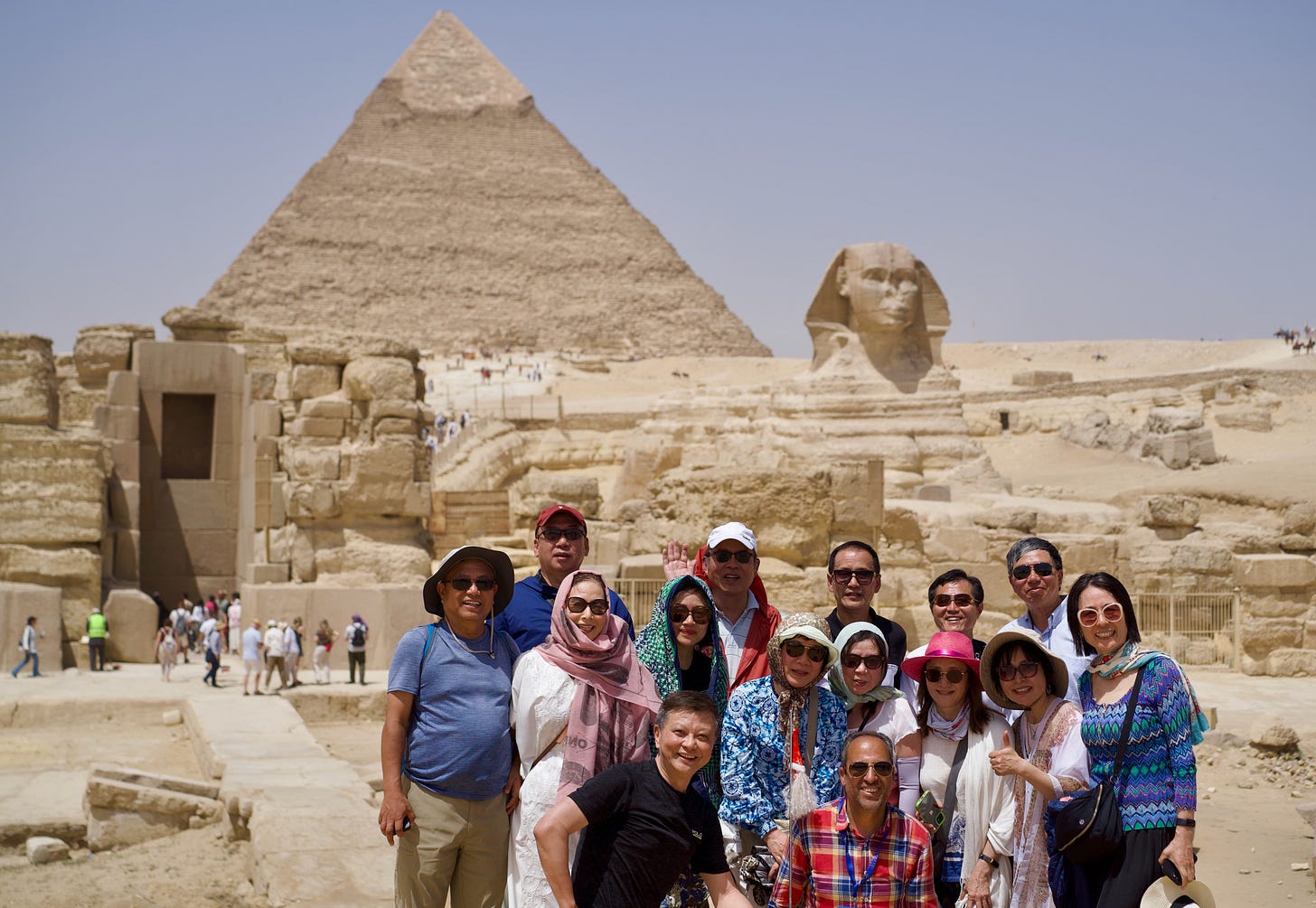Dear Koffeemocha readers and friends,
Returning from Egypt, I found myself utterly exhausted.
Three consecutive mornings of waking around 4 a.m., capped by a final 3 a.m. wakeup for the hot air balloon ride in Luxor, pushed me to my physical limits.
When visiting Luxor Temple, I nearly fainted — dehydration and sheer fatigue overwhelmed me.
After arriving home in New York City, I called my mother.
Hearing about the trip, she was puzzled:
"Was it travel you experienced, or an ordeal?"
Her question struck me.
Yes, this Egypt trip was fundamentally different from any I had taken before.
We didn't come seeking modern comforts or leisurely sightseeing.
We came seeking ancient civilizations — not modern convenience.
We are used to well-built infrastructure, comfortable transportation, and predictable routines.
But in choosing to visit Cairo, Aswan, and Luxor, we made a conscious decision:
- to learn,
- to experience,
- and to endure.
We knowingly exposed ourselves to discomfort, inconvenience, and even conflict — calculated risks we accepted in exchange for encountering the very roots of human history, ambitions and conditions.
Egypt was not just a destination.
It was a test — of curiosity, resilience, and the willingness to step beyond comfort to meet the ancient world face-to-face.
"Why did we endure the early mornings, the dehydration, the fatigue?
Because some journeys are not made for comfort — they are made for awakening."
10 Awakenings Along the Nile: Through the Lens of Koffeemocha
1. Embrace the Encore Mindset: Egypt as a New Beginning
Coming to Egypt was not a leisure trip — it was an encore of curiosity, courage, and resilience.
At this phase of life, I no longer travel just to see; I travel to restart a dialogue with mortality and eternity.
Like the Nile that renews itself with each flood before the High Dam, I sought renewal through endurance.
"If the trip was hard, it is because it mattered."
2. Balance "Being" and "Doing": Walking Between Ruins and Reflection
Rushing through temples, valleys, and pyramids could have turned this into another checklist tour — or an internet celebrity punch-in.
Instead, I felt the exhaustion, the overwhelming scale of Karnak, the silence of the Valley of the Kings — I let it transform into awakening (especially now as I re-enter the vibrant hum of New York City).
Between moving and pausing, between listening and pondering, it is a call of the balance of being and doing.
3. Lead with Curiosity and Openness: Beyond the Sand and Stones
Prof. Galal Kayed reminded us:
Civilization is layered. It’s never about one dynasty or king.
From the Pharaonic age through Greek, Roman, and Islamic rule, Egypt's soil holds accumulated wisdom, not singular stories.
We learned to peel back the layers, opening ourselves with great curiosity to contradictions, resilience, and rebirth.
4. Redefine Success and Legacy: A Civilization Measured in Eternity
Egypt taught me:
Success isn't measured by fleeting victories.
It’s measured by what survives after you are gone.
The pyramids, the myths of Osiris and Isis, the careful alignment of Abu Simbel to the sun — all echo the Egyptian pursuit of a legacy carved into eternity, not just into stone.
5. Cultivate Resilience through Strategic Risk-Taking: Choosing Endurance
I accepted calculated discomfort: waking before dawn, boarding flights across dusty airports, standing under the brutal sun.
This was not reckless adventurism.
It was strategic — because to understand ancient life, I had to feel, even faintly, the edges of their struggle.
No greatness comes without hardship.
6. Prioritize Relationships and Connection: Across Time and Space
Hearing Prof. G Kayed talk while cruising the Nile felt like a bridge connecting millennia.
In our group, through simple moments — sharing mango juice in Ismailia, watching the sunrise in Luxor as dozens of balloons floated into the sky — we forged silent bonds with each other, and with those who once lived by these waters.
7. Practice Reflection and Self-Improvement: Mirrors in Mythology
The myth of Isis reassembling Osiris became my metaphor:
Like Isis, I am piecing together the fragments of my identity, searching for wholeness, mourning losses, and hoping for rebirth in my second stage of life.
Each temple, each myth, was a mirror urging me to look within.
8. Think Like an Outlier: Traveling Against the Grain
While most travelers seek comfort, I accepted complexity.
I stepped into crumbling tombs, trusted ancient infrastructure, and traded luxurious travel for raw authenticity.
Egypt rewards those who are willing to diverge from the ordinary path.
9. Focus on Health and Wellness as a Foundation: Lessons from Dehydration
Fainting almost happened for a reason — not as failure, but as a reminder:
Even in pursuit of greatness, health is the foundation.
Ancient Egyptians revered the balance of body and spirit, evident in their embalming, healing practices, and cosmic balance.
In my quest for meaning, I must not forget to care for the vessel carrying me through time.
10. Make Time for Purposeful Play and Discovery: Joy Amid Endurance
Despite fatigue, moments of lightness sparkled:
- Laughing through chaotic camel rides at Giza
- Sipping lattes and Turkish coffee in Cairo bazaars
- Braving a barefoot adventure in a mosque bathroom
- Discovering that Abu Simbel’s solar alignment coincide with my birthday
Discovery wasn’t confined to monuments.
It lived in the unexpected joy along the journey — the playful echoes of eternity.
Egypt travel is not a vacation. It is a conversation — with time, mortality, ambition, and the human soul.
It demands much — and gives even more to those willing to walk a harder, slower, more thoughtful path (after the travel).
We didn’t just survive the journey.
We became part of its unbroken story.
We came seeking history. We found ourselves instead.
Thank you for being part of this reflection.
Until our next koffeemocha moment,
stay curious, stay bold.
Kefei|Koffee
Koffeemocha Moment in New York City




